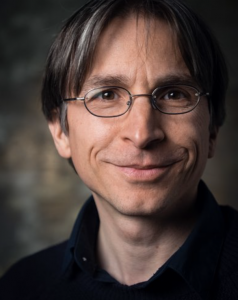by Linda Seger
Kategorie: Talks
VIDEO: Politisches Erzählen in populistischen Zeiten
VIDEO: Was beschäftigt die Branche: Stoffentwicklung bei Serien und Filmen
by Lars Wiebe und Jan Bennemann (Netflix)
VIDEO: From Reality to Fiction and back – Case study “La Mif”
by Fred Baillif
VIDEO: Audiences are the new avantgarde
VIDEO: Das narrative Gehirn
VIDEO: ZFICTION.22 Einführung
Stefan Jäger

Stefan Jäger studierte nach seiner Erstausbildung am kantonalen Lehrerseminar in Luzern an der Filmakademie Baden-Württemberg in Ludwigsburg Drehbuch und Regie. Er schloss die Ausbildung im Januar 1997 mit Diplom ab. Seit 2002 ist er in der Lehre tätig, u.a. als Dozent für Dramaturgie und Drehbuch an der Zürcher Hochschule der Künste, als Regiedozent in Ludwigsburg oder an der Schauspielschule in Stuttgart.
Er hat zahlreiche Spielfilme („Der grosse Sommer“, „birthday“, „Hello Goodbye“ u.a.) und Dokumentarfilme („Mathias Gnädinger – Die Liebe seines Lebens“, „Cyrill trifft“ u.a.) inszeniert, sowie mehrere Theaterstücke („Alte Freunde“, „57’ 38’’ Ewigkeit“). Als Drehbuchautor verantwortete er u.a. das Drehbuch zu „Schellen-Ursli“, einem der erfolgreichsten Schweizer Filme aller Zeiten. Mit seiner Firma tellfilm ist er als Produzent („Blue my mind“, „Tiere“ u.a.) tätig.
> ZFICTION.22 Talk:
Begrüssung – gemeinsam mit Michael Schaerer
In search of the „third cinema”
ABSTRACT BY RÜDIGER SUCHSLAND
What kind of films would Romy Schneider (be able to) make today? Or Jean-Paul Belmondo?
Observations of a cinema-goer
In my lecture I will try to formulate some theses on the situation of cinema in the present. Roughly speaking, I would like to start by outlining a certain type of film that exists much less today, perhaps not at all. It is a type of film that combines high standards with sophisticated entertainment, excess with depth.
I call this type of film, for lack of a better term, „the third cinema”. This „third cinema“ is neither a (post)modern blockbuster driven by fantasy and world transcendence, nor that (post)modern art cinema that has already halfway made it’s way into the gallery.
At the same time, „the third cinema“ has always been the synthesis between elements of these two types of films.
In the lecture, quite classically without images, I try to define this blank space and formulate my assumptions about its reasons.
It is important to note: I am not arguing against a cinema that exists today, but I plead for a cinema that existed in the past and that I miss today.
I understand my lecture as an impulse to remember these films and the many unused possibilities of cinema again – if it goes well, then all the filmmakers present become quite wistful afterwards and immediately feel like making such films again themselves.
Das Publikum ist die neue Avantgarde
Abstract von Vinca Wiedemann
Das Publikum in aller Welt gewöhnt sich rasch an neue Formen der filmischen Erzählung. Jeden Abend schauen sie sich den neuesten Film oder die neueste Serie an, und am nächsten Abend verlangen sie mehr vom Gleichen und eine noch fortschrittlichere Erzählweise.
Doch die Entwicklung und Produktion neuer Filme und Serien dauert Jahre. Was brauchen Filmschaffende und die Industrie, um in einer Welt der neuen Medien und Genres, der veränderten Finanzierung und der neuen Märkte frische und reichhaltige Geschichten zu erzählen?
Anhand von Beispielen aus meiner Zusammenarbeit mit jungen internationalen Filmtalenten sowie mit den dänischen Veteranen Lars von Trier, Susanne Bier und Thomas Vinterberg werde ich mich auf die Mündlichkeit und den kollektiven Dialog als interessante Werkzeuge für das Geschichtenerzählen der Zukunft konzentrieren und Wege aufzeigen, wie die Branche den Dialog und das Feedback zwischen verschiedenen Sektoren und „Stämmen“, die es nicht gewohnt sind, zusammenzuarbeiten und miteinander zu kommunizieren, initiieren kann.
Audiences are the new avantgarde
Abstract by Vinca Wiedemann
Global audiences are rapidly adapting to new ways of cinematic storytelling. Every night they stream the newest film or serial, and the following night they demand more of the same and even more advanced storytelling.
But new films and series take years to create and produce. What does it take for creators and industries to create fresh and rich storytelling in a world of emerging media and genres, changed financing and new markets?
Based on examples from my collaboration with international young film talent as well as with Danish veterans Lars von Trier, Susanne Bier and Thomas Vinterberg, I will focus on orality and collective dialogue as interesting tools for future storytelling, and I will suggest ways for the industry to initiate dialogue and feedback between different sectors and “tribes” that are not used to collaborate and communicate with each other.
Storytelling beyond the template – Open narrative structures in film education and dramaturgy
Abstract by Kathrin Resetarits
Film education and dramaturgy beyond the template
After a long wasteland in which the supremacy of a particular narrative form – propagated by rulebooks and instruction books – was cemented and propagated with almost religious zeal, cinematic narrative forms away from this structural template are once again coming more to the fore. The fact that something is breaking out here certainly has to do with the fact that strictly dramatic or plot-centered films are losing their appeal due to their predictability and over-standardization, and new series formats are becoming increasingly important on the market. Fortunately, this also promotes diversity in content, artistic expression, and the activation of otherwise passively entertained viewers. This liberation is the prerequisite for lively, resonance-generating and socially relevant storytelling.
New approaches are needed to deal with thematically bound and constellative structures in which plot is not a priority. Approaches and recipes can only be simply adopted to a very limited extent, since in many cases they lead to deformations and limitations of the intended content. The unquestioned must be questioned, basic narrative techniques that start before the dogmas of Hollywood production must be worked out or reweighted.